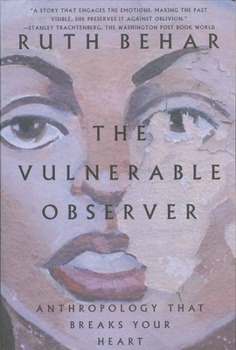The Vulnerable Observer: Anthropology That Breaks Your Heart
Select Format
Select Condition 
Book Overview
The 25th-anniversary edition of the groundbreaking book that changed anthropology, asserting that ethnographers needn't exclude themselves or their vulnerabilities from their work In a new epilogue to... This description may be from another edition of this product.
Format:Paperback
Language:English
ISBN:0807046310
ISBN13:9780807046319
Release Date:November 1997
Publisher:Beacon Press
Length:208 Pages
Weight:0.59 lbs.
Dimensions:0.6" x 5.4" x 8.0"
Customer Reviews
4 ratings
For postmodern intellectuals
Published by Thriftbooks.com User , 14 years ago
Behar's first-person anthropological essays are perfect for the postmodern generation of intellectuals. Why pretend that we're unbiased, dispassionate observers when clearly we're human beings who are deeply affected when we witness war and poverty and other tragedies? Why has the Academy considered this distance to be preferable? I'm not an anthropologist myself, but I guess you could say I'm a writer/journalist and I think these principles can apply to this field as well.
The Unbiased Ethnographer
Published by Thriftbooks.com User , 16 years ago
This book covers the notion of including yourself in scholarly writing as a way of acknowledging your bias, and thusly over coming it. Beautifully written and interesting, especially for those seeking to learn creative non-fiction. (ie ethnographers, art educators, critics, anthropologists, etc)
A book that breaks myths
Published by Thriftbooks.com User , 22 years ago
This book brings to life the fact that it is not possible to separate science from discourse. It shows through its essays that what sees the fact is not the impartial researcher's eye (does it exist?) but the value-stricken vision of the observer.In this sense, we are all vulnerable observers. A must for those worried about the deep questions posed by science as a neutral practice. All of us are part of a web of meanings that makes us understand the world and comprehend a fact as a fact. Good reading for those who think positively as well.
She brings anthropology to life....
Published by Thriftbooks.com User , 24 years ago
As an anthropology student in pursue of the human face of my career I found the light at the end of the tunnel when I read the Vulnerable Observer...and as a Cuban in exile, the book broke also my heart...Not only Dr. Behar marvelously demonstrates the humanness of the hands and mind behind the typewriter (actually behind the keyboard), but she also opens the doors for those of us who want to be visible to the reader, and not precisely as narcissists but because as she says in her book "...The exposure of the self who is also a spectator has to take us somewhere we couldn't otherwise get to. It has to be essential to the argument, not a decorative flourish, not exposure for its own sake. It has to move us beyond that eclipse into inertia ..., in which we find ourselves identifying so intensively with those whom we are observing that all possibility of reporting is arrested, made inconceivable. It has to persuade us of the wisdom of not leaving the writing pad blank" (Behar, 14). We need more anthropology like this and more anthropologists like her...Another vulnarable observer...






